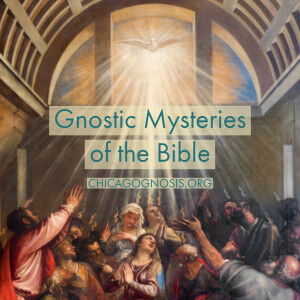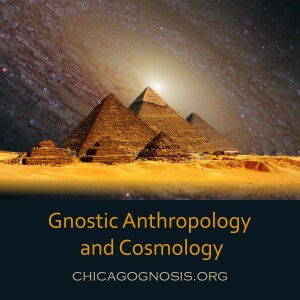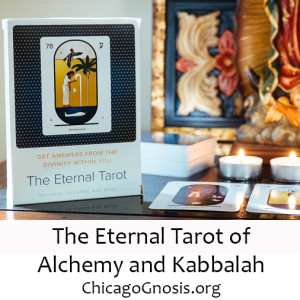
245.1K
Downloads
261
Episodes
Free lectures on spirituality, religion, mysticism, meditation, psychology, kabbalah, alchemy, tantra, sacred sexuality, runes, dreams, astral projection, kundalini, yoga, the Bible, and more. From the Gnostic Academy of Chicago, a non-profit organization.
Free lectures on spirituality, religion, mysticism, meditation, psychology, kabbalah, alchemy, tantra, sacred sexuality, runes, dreams, astral projection, kundalini, yoga, the Bible, and more. From the Gnostic Academy of Chicago, a non-profit organization.
Episodes

Saturday May 04, 2019
Gnostic Mysteries of the Bible | Biblical Psychology
Saturday May 04, 2019
Saturday May 04, 2019
The Bible is deep, intricate, and mystical. Its psychological teachings, moreover, offer insights into how to practically develop our complete spiritual potential. Through its allegorical narratives, the Torah and Gospels depict the soul’s inception, struggles, and redemption. By comprehending the Bible’s cosmological dramas and its characters’ symbolic roles, aspirants can learn how to enact lasting inner change and procure the alleviation of humanity’s suffering. Discover how through the stories of Cain (the ego), Abel (the Essence or soul), Nimrod and the Tower of Babel (the personality), and Christ (our divine Being and legitimate identity).
Resources and References:

Saturday Apr 20, 2019
Gnostic Mysteries of the Bible | Secrets of Gnostic Easter
Saturday Apr 20, 2019
Saturday Apr 20, 2019
Christ is a universal principle within all religions, not only incarnated within Jesus of Nazareth, but Quetzalcoatl, Krishna, Buddha, Moses, and all masters properly prepared through initiation. Just as the Spring sun resurrects nature, likewise Christ, the cosmic solar energy of divine intelligence, resurrects spiritual life within the soul through the mysteries of Easter. Discover how through an explanation of Kabbalah, sacred sexuality, and Ishtar’s descent into the underworld.
Resources and References:
https://chicagognosis.org/lectures/secrets-of-gnostic-easter

Saturday Mar 23, 2019
Gnostic Anthropology and Cosmology | The Transmigration of Souls
Saturday Mar 23, 2019
Saturday Mar 23, 2019
"I died as a mineral and became a plant, I died as plant and rose to animal, I died as animal and I was Man. Why should I fear? When was I less by dying? Yet once more I shall die as Man, to soar With angels blest; but even from angelhood I must pass on: all except God doth perish. When I have sacrificed my angel-soul, I shall become what no mind e'er conceived. Oh, let me not exist! for Non-existence proclaims in organ tones, To Him we shall return." ―Jalal al-Din Muhammad Rumi
This lecture discusses reincarnation, the law of karma, and the manifestation of the divine in accordance with practical, spiritual works. Learn how the soul migrates through its many experiences throughout different forms of matter, energy, and consciousness, and what laws we need to work with in order to escape suffering. This lecture also discusses the manifestation of the soul [psyche] as depicted in Gnosis, Greece, Hinduism, Buddhism, Islam, Kabbalah, and many other scriptures and texts.
Resources and References:
https://chicagognosis.org/lectures/the-transmigration-of-souls

Saturday Feb 09, 2019
Gnostic Anthropology and Cosmology | Consciousness and Our Multidimensional Universe
Saturday Feb 09, 2019
Saturday Feb 09, 2019
Esoteric science begins where empirical science ends: through the objective development of spiritually-illuminated consciousness. This is in order to investigate mystical phenomena as cited throughout Buddhism, Christianity, Hinduism, and other religions. Learn about perception, time, the spatial sense and the science behind conscious investigation, the laws governing the multidimensionality of the cosmos, and the role of science's enigmatic ether. This lecture refers to the writings of Albert Einstein, the 14th Dalai Lama, Helena Petrovna Blavatsky, and others, discussing various modes of cosmic energy known as Akasha and the Tattvas (elemental principles) of nature.
Resources and References:
https://chicagognosis.org/lectures/consciousness-and-our-multidimensional-universe

Saturday Jan 19, 2019
Gnostic Anthropology and Cosmology | Introduction
Saturday Jan 19, 2019
Saturday Jan 19, 2019
Millions venerate the profound architectural and artistic achievements of the ancient world: the Egyptian, Aztec, and Mayan pyramids; the immaculate sculptures of Greece and Rome; the sacred Buddhist iconography of India, China, and Tibet, and countless other marvels. While such artifacts testify to the cultural, historical, and religious legacy of their creators, they also convey the secret teaching of all ages: how to unite the consciousness with the divine through the four pillars of science, mysticism, art and philosophy. Discover also the metaphysical basis of humanity’s origins, trajectory, and potential.
Resources and References:
https://chicagognosis.org/lectures/introduction-to-gnostic-anthropology-and-cosmology

Saturday Dec 15, 2018
The Eternal Tarot of Alchemy and Kabbalah 22 The Return
Saturday Dec 15, 2018
Saturday Dec 15, 2018
All scriptures and spiritual traditions allude to the longed-for goal of Self-realization: the return to divinity through conscious works. However, such references remain elusive to the animal intellect, which only understands literal interpretations and blind adherence to the dead letter. Without applying practical techniques for the development of the soul, aspirants close the doors to the complete actualization of religion (from the Latin religare: "reunion"; or the Sanskrit yug, the root word for yoga).
The spiritual path has also never been revealed to the public in its entirety, but was only demonstrated through the profound symbolism of scripture: the internal language of divinity. This lecture concludes the twenty-two major arcana with an explanation of the three mountains: the distinct stages of the path of initiation; and exegeses of the Qur'an, the Bible, and the writings of Samael Aun Weor. You will also learn how the gnostic esoteric work is sealed through the succession of the prior arcana and the mysticism of the Hebrew letter Tav, allegorized by the ascension of the Prophet Muhammad: the Seal of the Prophets (Khātim an-Nabīyīn).
Resources and References:

Saturday Nov 17, 2018
The Eternal Tarot of Alchemy and Kabbalah 21 Transmutation
Saturday Nov 17, 2018
Saturday Nov 17, 2018
All the great mystical traditions speak about the dangers of the initiatic path, how it is easy to have esoteric knowledge while lacking discretion, foresight, and wisdom. Many followers of spiritual and religious groups fail to truly enact the principles of their scriptures, thereby resulting in tremendous suffering, conflict, and ignorance.
These people are known as pharisees, fanatical adherents to the dead letter of religion who lack a comprehensive, experiential understanding of what their traditions teach. Such individuals in every spiritual teaching embody the terrible reality of the Fool, the Bohemians of the Tarot who believe they possess the totality of true knowledge when they only know a fraction of it.
This arcanum depicts the tragedy, failure, and downfall of the initiate who, while close to the end goal of Self-realization, does not know how to maintain chastity, thereby transforming him or her into a lunatic or follower of egotistical, mechanical nature. Discover the warnings of this arcanum through the works of the prophets, the Qur'an, the Sufis, Friedrich Nietzsche's Thus Spoke Zarathustra, the kabbalistic Zohar, and the mysteries of the Hebrew letter Shin.
Resources and References:

Saturday Oct 27, 2018
The Eternal Tarot of Alchemy and Kabbalah 20 Resurrection
Saturday Oct 27, 2018
Saturday Oct 27, 2018
Judaism, Christianity, and Islam are based upon belief in resurrection, yet its spiritual reality is not realized nor understood by the uninitiated. Only those practitioners of the direct path, the revolution of the consciousness, can hope to achieve the heights of resurrection: the culmination of profound psychological works and the complete annihilation of the animal ego. When the "I" is eliminated, the Being resurrects within the purified soul, which rises from the grave of Klipoth to enter the heavenly realms.
This card synthesizes the victories and struggles of the previous arcana, which liberate the soul through mystical experiences and payment of one's karma. When the self dies, the consciousness escapes and resurrects within the higher regions of nature. Learn how through a profound study of mummification, astral and jinn experiences, the famous Day of Judgment within the Qur'an and the Egyptian Book of the Dead, the fall of Count Zanoni during the French Revolution, the three types of resurrection within the writings of Samael Aun Weor, the mysteries of Osiris within Freemasonry, and the Kabbalistic mysticism of the Hebrew letter Resh.
Resources and References:

Saturday Sep 22, 2018
The Eternal Tarot of Alchemy and Kabbalah 19 Inspiration
Saturday Sep 22, 2018
Saturday Sep 22, 2018
After overcoming terrible battles against negative forces in the previous arcanum, the sincere student develops light and eradicates the causes of suffering. By conquering the mind, the consciousness experiences genuine happiness and liberation. This is the esoteric significance of inspiration: the compelling force of enthusiasm, joy, and perseverance in the spiritual work.
This arcanum is deeply related to the powers of transmutation, for to in-spire the vital air is to take in the solar forces necessary for one’s development. The creative energy generates the virtues of contentment, serenity, certainty, and joy, for by breathing in prana and mixing it within one’s seminal system, the alchemist elevates the soul and aspires towards the heights of redemption. Learn how through a profound study of the sacred Kaaba: the philosopher’s stone of the Muslim initiates, Richard Wagner’s Parsifal and Siegfried, the parable of the Wedding Garment in the Christian Gospels, the Hebrew Psalms, the esoterism of the Hebrew letter Quf and the Arabic Qāf, the story of Cain and Abel, Prophet Muhammad’s revelation of the Holy Qur’an through the Angel Gabriel, and Friedrich Nietzsche's Thus Spoke Zarathustra.
Resources and References:

Saturday Aug 18, 2018
The Eternal Tarot of Alchemy and Kabbalah 18 Twilight
Saturday Aug 18, 2018
Saturday Aug 18, 2018
Every aspirant on the path of self-realization must encounter and battle negative forces, both within themselves and within the internal dimensions. This eternal struggle is represented in every spiritual tradition by the confrontation between good and evil, the struggle of the soul against the animal mind, desire, defects, sins, etc. This arcanum also warns of diabolic entities who fight to pull initiates from the spiritual path, so as to enter submerged devolution within the infernal worlds.
This lecture explains the mysteries of spiritual war, the conflict between consciousness and ego, the Greek myth of Cerberus, the nine submerged realms of Dante's Inferno, the Four Noble Truths and the Eightfold Path according to Aquarian Gnosticism, a Zoharic commentary on the Book of Genesis, and the symbolism of the Hebrew letter Tzadi.
Resources and References:
